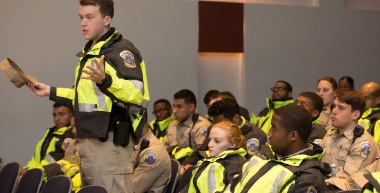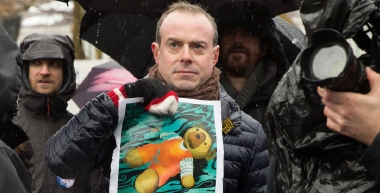Making me a better officer.
‘After I went to the Law Enforcement & Society program, I felt as though it made me a better police officer.’
Peter Newsham
Chief of the Metropolitan Police Department, Washington, D.C.
Police, laws and individual rights.
Peter Newsham has had a long career in law enforcement, rising through the ranks of the Washington, D.C., Metropolitan Police Department to become chief of police. But he learned some surprising things about police work when he participated in ADL’s Law Enforcement & Society (LEAS) training program.
The program, developed in partnership with the United States Holocaust Memorial Museum, uses the history of the Holocaust in World War II—when more than 11 million people, including six million Jews, were systematically murdered by the Nazis—as a springboard for examining the role of law enforcement in our democracy and the relationship of the police to the people they serve.
“The extent to which law enforcement was complicit then is something so horrific,” says Chief Newsham, “and something in which I will never allow myself to be involved.” He went on, “I’m hopeful that every officer that comes here for this training will feel the same way.”
Law Enforcement & Society began in 1999 when Washington, D.C., Chief of Police Charles Ramsey asked ADL and the Holocaust Memorial Museum to create a training program for his recruits. Since then, more than 130,000 law enforcement professionals have participated in this innovative training experience.
Absorbing the lessons of the Holocaust.
What can the Holocaust reveal to contemporary law enforcement officials about their role? It demonstrates to them how power can be abused and how ordinary people can be transformed into perpetrators. It strengthens their understanding that their chosen calling requires them to act as the guardians of all those they serve and that every interaction must be guided by the values of our nation and of their profession—fairness and respect, courage and compassion.
Law Enforcement & Society is such a profoundly transformative and unique program because it contrasts the values of Nazi Germany with the core values of American law enforcement and its role as protector of the Constitution.
The participants range from chiefs of police and the heads of federal law enforcement agencies, such as the Federal Bureau of Investigation and Immigration and Customs Enforcement, to police recruits and FBI New Agents—men and women representing hundreds of departments from every corner of our country.
A tragic tale of safe havens that resonates today.
Chief Newsham was especially struck by the Museum’s story of the MS St. Louis, the ill-fated German ocean liner that carried 900 Jewish refugees from Germany. After they were denied entry to Cuba, the United States and Canada, the refugees were forced to return to Europe, where at least a quarter of them died in Nazi death camps. “It gets us thinking about our immigration policies and being accepting of refugees who are trying to leave an awful circumstance. I’ll never forget seeing that and thinking about that.”
LEAS has been incorporated into the curricula of the most prestigious law enforcement training programs in the country: the FBI National Academy, the FBI National Executive Institute, and the FBI Law Enforcement Executive Development Seminar. It is now offered in Los Angeles, Tampa, Nassau County (NY), Houston and St. Louis, along with the original program in Washington, D.C.
In addition to Law Enforcement & Society, ADL provides other law enforcement training programs that equip more than 14,000 law enforcement professionals per year with the tools they need to deal with extremism, terrorism and hate crimes. And ADL helps them build trust with the people they serve. In fact, ADL has become the nation’s top nongovernmental law enforcement
training organization.
States Chief Newsham, “It’s incumbent on me to make sure all the officers who work for me have the same experience. To have that piece in their toolbox, that realization of the role of law enforcement in society, is extremely important for a police officer.”











